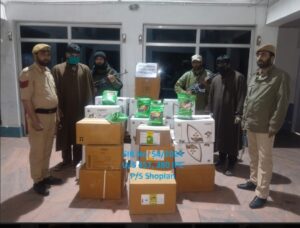Jammu, Mar 13 (PTI) Jammu and Kashmir’s oil industry will witness a significant transformation, with the implementation of multifarious initiatives under the Holistic Agriculture Development Program (HADP) by the Agriculture Production Department, a senior government official said on Monday.
The recent release of a final report by an Apex Committee headed by Mangla Rai, former DG ICAR, has charted out the roadmap for the implementation of 29 projects under HADP.
Significantly, among the approved projects, the promotion of oilseed cultivation has been given due consideration. The oil seed project included several interventions aimed at increasing production and productivity, with an estimated annual output worth Rs 1,290 crore, Additional Chief Secretary, Agriculture Production Department, Atal Dulloo said.
He said the department will be implementing a multifaceted initiative aimed at promoting oilseed cultivation in the region with a project outlay of Rs 31.00 crore.
“This three-year project is expected to create more job opportunities and contribute towards overall economic growth of the region,” he said.
Jammu and Kashmir is known for its diverse agro-climatic conditions that provide a suitable environment for the cultivation of various crops, including oilseeds.
“To promote oilseed cultivation in the region, the J & K government has taken several initiatives under the HADP. The government intends to bring 210 Th Ha under oilseed cultivation from the current 140 Th Ha over the next three years. About 202.50 Th Ha shall be covered under rapeseed and mustard cultivation and 7.50 Th Ha shall be covered under sesame seed cultivation,” Dulloo said.
Besides, 70,000 Ha of additional areas shall be covered in potential oilseed districts like Kathua, Samba, Jammu, Udhampur, Rajouri, Reasi, Anantnag, Kulgam, Pulwama, Budgam, and Ganderbal and districts like Shopian, Bandipora, Ramban, and Doda, by utilising fallow lands, culturable wastelands and leveraging increased cropping intensity apart from promoting intercropping systems, he said.
He said over 50 per cent of the net sown area in the Jammu division is rain-fed. Therefore, this project aims to promote crop diversification by cultivating sesame seeds as a Kharif crop in Kandi and rain-fed areas of the Jammu division.
“The total requirement of edible oils in the UT is 14.20 lakh quintals, whereas the UT produces only 3.36 lakh quintal. Hence, this initiative is crucial for the region’s food security and economic growth,” he said.
As part of the project, he said, farmers will receive 50 per cent assistance with a subsidy ceiling of Rs 4,000 per quintal for purchasing high-yielding varieties of mustard and rapeseed.
Similarly, a 50 per cent subsidy with a ceiling of Rs 8,000 per quintal will be provided to beneficiaries for procuring hybrid rapeseed, mustard, and improved varieties of sesame seed, Dulloo said.
Additionally, to improve the seed replacement rate of oil seeds, a 50 per cent subsidy with a ceiling of Rs 2,500 per quintal will be provided for producing foundation and certified seeds to boost productivity and promote area expansion.
To further increase cultivation, 11,200 Ha will be brought under cluster cultivation of oil seeds, with 50 per cent incentives extended up to Rs 5,000 per Ha under cluster demonstrations and up to Rs 7,000 per Ha under front-line demonstrations to meet all input costs for the cultivation of mustard, rapeseed, sesame and linseed, he said.
Additionally, under post-harvest management, a 50 per cent incentive will be provided for the establishment of 70 oil mills with filter press, 30 oilseed extractors, and two branding and marketing units.
The project is expected to lead to a net increase in the return to farmers by 10 to 12 per cent and a reduction in input costs by 15 to 20 per cent, besides creating 7,800 jobs and 300 enterprises, the official said.








